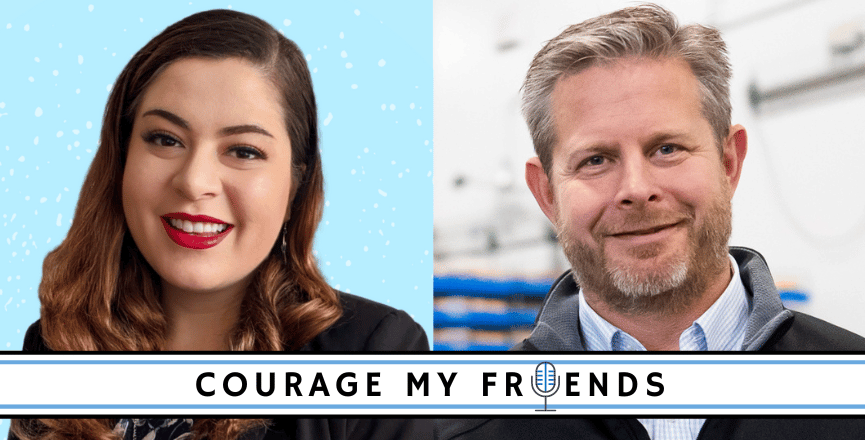On this episode of the Courage My Friends podcast, Neil Hetherington, CEO of The Daily Bread Food Bank and Maria Rio, director of development and communication for The Stop Community Food Centre discuss the current state of food insecurity in Canada’s largest city, how we got here and what we need to end decades of hunger.
Of the growing reliance on Toronto’s food bank system, Hetherington says:
“What is startling is the fact that there are over 9,000 new registrants to the Foodbank system in the Toronto area, served by Daily Bread and North York Harvest each month.. almost 10,000 people are putting up their hand and saying, “I am in a position where my income does not meet the expenses that I have and I need to rely on food charity this week or this month. …Prior to the pandemic, 15% of the people that came to the food banks were employed fully. That number has doubled to 30%. And just around 50% of food bank users have a post-secondary education. And so people have done what we told them to do growing up. Go get an education, grab a job and you’ll be fine. You’ll get that house with a white picket fence. And that’s not the reality.”
Rio describes the current and increasing challenges facing organizations like the Stop Community Food Centre:
“The Stop is also being hit by inflation. So not only are we paying more for food because there’s decreased food drives and all those things. There’s more people coming to our services ..it’s been an exceptionally challenging time. We’ve had to make really difficult decisions around how do we keep serving our community, but not go into an extremely unsustainable position as an organization? We have to remain open next year. as more and more people run out of other options, such as friends or using credit cards or predatory payday loan services, they’re turning to us and we’re kind of left scrambling to meet the need with less volunteer help, with less energy than we had two years ago and strain on our resources because our donors are also feeling the pinch.”
Speaking to the importance of food banks, Hethrington says:
“What we have set out to do over the last number of decades is remind people that food banks are not the answer to food insecurity; we’ve never claimed that we are. But we do make food available this week for people. .. where we do claim that we are fighting to end hunger is around our advocacy efforts and taking a leadership position?”
Reflection on Canada’s failed commitments to end hunger, Rio says:
“Canada first signed the International Covenant on Economic, Social, and Cultural Rights at the UN, where they ratified the right to food, right to adequate food, clothing, and housing, and to the continuous improvement of living conditions.
And to know that we’ve been talking about this issue for so long, we’ve had so many consultations at all levels of government…we’ve known for a really long time that social assistance rates are abysmally low. That it’s a lot of newcomers who are experiencing these barriers. Racialized people, people with disabilities and an intersection of all those identities. We’ve known that for more than the 40 years that The Stop has been around, or food banks have been around.”
About today’s guests
Neil Hetherington joined The Daily Bread Food Bank as CEO in January 2018. Beginning his career in project management at Tridel Construction, in September 2000, he made a career change by joining Habitat for Humanity Toronto, at the time as the youngest CEO of a Habitat affiliate in the world. His non-profit experience includes 16 years as CEO of Habitat for Humanity in Toronto. Then New York City, and two years as CEO of Dixon Hall, a multi-service agency serving thousands of people in Toronto. Neil holds credentials from the University of Western Ontario, Huron College, Seneca College, Harvard Business School, and the University of Virginia, Darden Business School and obtained his MBA from the University of Western Ontario’s Ivey Business School in 2013.
Maria Rio has over a decade of fundraising and non-profit experience. As a woman, a racialized person, an immigrant, and a member of the LGBTQ2+ community andfrom her early experience as a refugee, Maria’s experience shaped a passion for human rights that fuels her drive to give back and make a difference in the lives of people of various marginalized and often intersectional and underrepresented groups. Her work has appeared in publications such as the Globe and Mail, the Toronto Star and the Canadian Centre for Policy Alternatives’ magazine. She was a finalist for the national 2022 Charity Village Best Individual Fundraiser Award. Maria also sits on the Board of Living Wage Canada.
Transcript of this episode can be accessed at georgebrown.ca/TommyDouglasInstitute or here.
Image: Neil Hetherington and Maria Rio / Used with Permission
Music: Ang Kahora. Lynne, Bjorn. Rights Purchased
Intro Voices: Ashley Booth (Podcast Announcer). Bob Luker (voice of Tommy Douglas); Kenneth Okoro, Liz Campos Rico, Tsz Wing Chau (Street Voices)
Courage My Friends Podcast Organizing Committee: Chandra Budhu, Ashley Booth, Resh Budhu.
Produced by: Resh Budhu, Tommy Douglas Institute and Breanne Doyle, rabble.ca
Host: Resh Budhu




